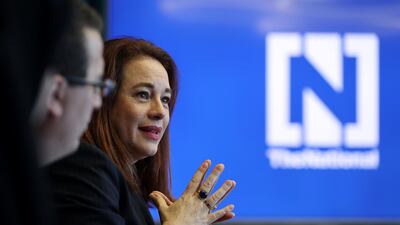The world faces catastrophic climate change if governments do not put forward billions of dollars and undertake a complete societal shift, United Nations General Assembly President Maria Fernanda Espinosa warned on Monday in an interview with The National.
She issued a call for “climate justice” and warned that “scary” data from recent expert reports show a lack of progress across the world.
"The ambition and the action is far behind our commitments and what we need to do," she said, speaking at The National's office in Abu Dhabi.
Calling for a society-wide undertaking, Ms Fernanda Espinosa said that “[recent reports] are telling us we’re not doing enough, and that humanity is under threat and we are going to disappear because millions of people are losing their livelihoods, their lands, their everything”.
The Ecuadorian diplomat, who is in the UAE to attend the World Government Summit in Dubai, warned that there are now “millions of climate refugees” and that numbers are increasing.
She admitted that there has been some progress on climate change and praised the efforts of countries such as the UAE, which is investing heavily in renewable energy production.
“What the UAE is doing it is really commendable, really putting a lot of effort and resources to change their energy metrics and that is what the entire world should do,” she said.
But Ms Fernanda Espinosa pointed out that even if the full terms of the 2015 Paris Climate Agreement were met it would not come close to keeping temperatures to below the target 1.5 degrees Celsius.
“This is not a scientific or technical issue, no it is telling us – our children and future generations – that this is really a survival threat to humanity so we need to put [forward] the resources, the billions of dollars that are needed for the proper ecological transition,” she said.
While there has been significant progress in some areas of the 17 SDGs for 2030, it is true there has been unequal progress, she said.
“It is morally unacceptable that the numbers of hungry people are increasing [while] we are increasing our capacity to produce food,” she said as she called for a recommitment to the 15-year plan agreed four years ago.
She said that the "timely" World Government Summit offered an opportunity "to discuss successful governance models and how to adapt our governance to the sustainable development goals and the new multilateral challenges".
While attending the World Government Summit, she was seen speaking to actor Harrison Ford who released a video last week warning of the dire consequences of failing to act on climate change.

Speaking at the summit on Sunday, Ms Fernanda Espinosa stressed the need to work collectively to achieve Sustainable Development Goals (SDGs) and the UN’s 2030 vision that covers everything from environmental security to poverty alleviation and literacy.
But Ms Fernanda Espinosa is clear in her vision for the future of global governance and sees the UN General Assembly at its heart. During her one year presidency of the body, which began in September, she says she hopes to see crucial reforms of the global body take shape.
In her interview with The National, she described how part of this is ensuring the world body is "fit for purpose", while much is about ensuring relevancy and accountability.
She said that management reform taking place was making the UN “more accountable, more transparent, more efficient and less bureaucratic,” in order to improve implementation of resolutions the international community agrees on.
“We do have an implementation crisis of the almost 300 resolutions that we pass every year,” she said, calling on more to be done to ensure work is followed through.
Part of that reform, addressing the near quarter of a century conversation about the role of the UN Security Council, was also being pushed forward under the two co-chairs Ms Fernanda Espinosa has appointed – the UAE and Luxembourg.
“I want to make sure that the process leads to some kind of outcome this year but we cannot be naive – it is very contentious, it is a very difficult issue,” she said. “But there is agreement on one thing: that the Security Council needs to improve its working methods and needs to adjust to the current geopolitics.”
For the leadership of a body that is so often detached from the realities of the everyday lives of peoples, Ms Fernanda Espinosa repeatedly stated her desire that the reform makes sure the UN works not just for ordinary people but for the world’s poorest people.
Last month, Palestinian President Mahmoud Abbas took over the chair of the UN’s largest block – the Group of 77, a body of 134 countries that represents the world's developing nations.
Ms Fernanda Espinosa said that the State of Palestine, which does not have full membership of the UN, is doing a good job as chair of the body.
When Mr Abbas travelled to the UN office in New York last month to take over the position, the General Assembly president stressed the need for Palestine to act in the interests of all members and not use it solely as a vehicle to push for progress in the Israeli-Palestinian peace process.
A month on, Ms Fernanda Espinosa said that Palestine was developing a program of work adopted by all members and that it was “operating as an honest broker and as an enabler of consensus building”.









